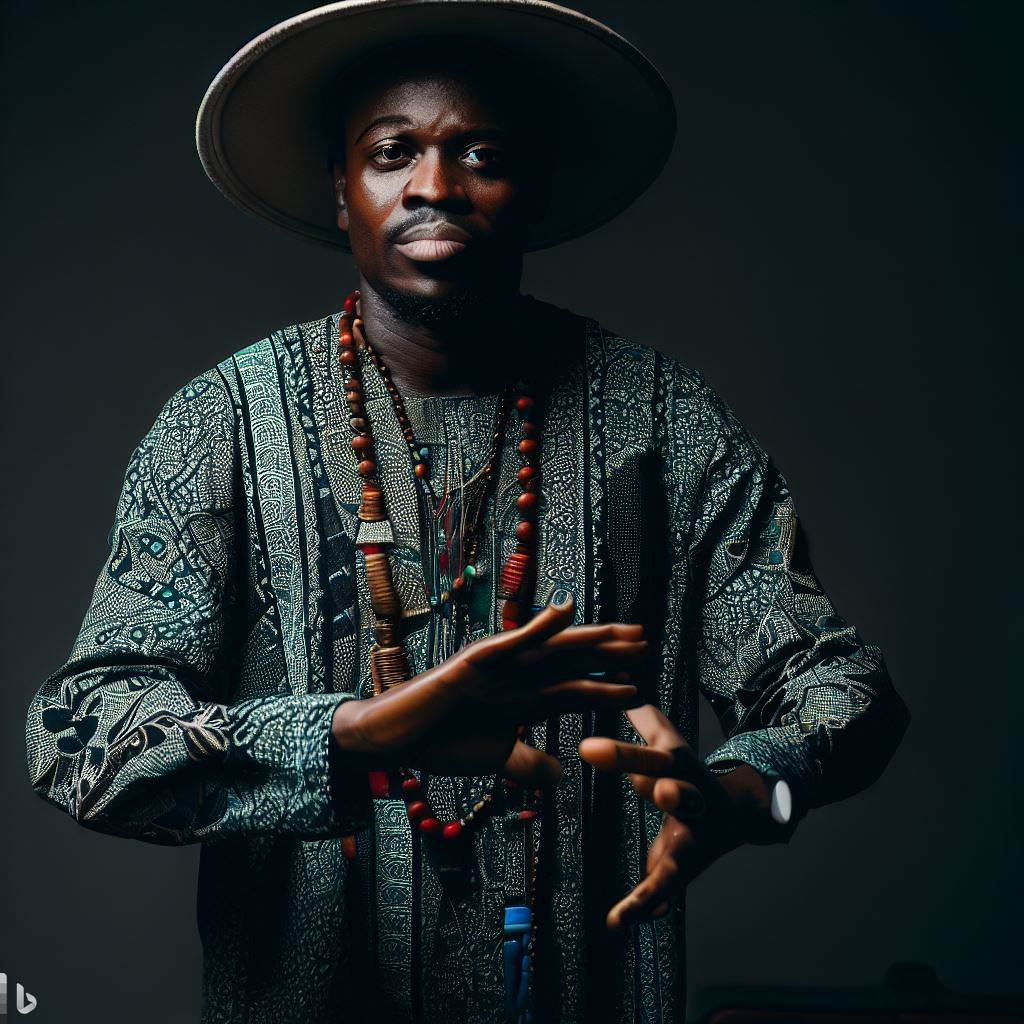Introduction
The Nigerian Music Industry
The Nigerian music industry is a thriving and influential sector in the country’s cultural landscape.
Importance of understanding the industry from a director’s perspective
Understanding the industry from a director’s perspective is crucial for success and effective decision-making.
The Nigerian music industry is a vibrant and dynamic sector that plays a significant role in the country’s cultural landscape.
With its unique blend of indigenous sounds and global influences, Nigerian music has gained international recognition and a dedicated fan base.
As a director in this industry, it is essential to comprehend the inner workings and nuances of this complex ecosystem.
Understanding the Nigerian music industry from a director’s perspective is vital for several reasons.
Firstly, it allows directors to navigate the intricate network of stakeholders, including artists, producers, record labels, and distributors.
By understanding the roles and functions of each player, directors can effectively manage collaborations, contracts, and business relationships, thereby ensuring the success of their projects.
Additionally, comprehending the industry from a director’s standpoint enables one to identify emerging trends and opportunities for growth.
The music industry is highly dynamic, with constantly evolving consumer preferences and technological advancements.
By staying informed about market trends, directors can make informed decisions about investments, marketing strategies, and talent acquisition.
Furthermore, understanding the Nigerian music industry from a director’s perspective fosters effective leadership and creative vision.
Directors who possess an in-depth knowledge of industry practices can provide guidance and mentorship to artists, helping them navigate the competitive landscape and reach their full potential.
Understanding the Nigerian music industry from a director’s perspective is crucial for success and effective decision-making.
By comprehending the industry’s intricacies, directors can navigate its complexities, identify opportunities, and provide effective leadership in this dynamic and influential sector.
The Role of a Director in the Nigerian Music Industry
Definition and responsibilities of a music director
- A music director is a professional responsible for overseeing the creative and technical aspects of music projects.
- Their primary role is to bring together all the creative elements and translate the artist’s vision into reality.
- They work closely with the artist to plan and execute the musical direction of a project.
- A music director is responsible for choosing the right team, including musicians, producers, and engineers, to achieve the desired sound.
- They ensure that the artist’s musical vision is reflected in the project by providing guidance and making critical decisions.
- Additionally, they may also be involved in arranging, composing, and conducting music as required.
- Overall, a music director’s responsibilities revolve around creating a cohesive and compelling musical experience.
Importance of directors in creating successful music projects
- Directors play a crucial role in the success of music projects by bringing clarity and cohesion to the artistic vision.
- They provide a fresh perspective and contribute innovative ideas to enhance the project’s overall quality.
- Directors have a deep understanding of industry trends and audience preferences, enabling them to create commercially viable music.
- They ensure effective communication among all team members, minimizing conflicts and maximizing productivity.
- Directors bring out the best in the artists, pushing them to explore their artistic boundaries and deliver their finest performances.
- They have a keen eye for detail, ensuring that every aspect of the project, from production to marketing, is executed flawlessly.
- Ultimately, directors are instrumental in creating music that resonates with the audience and leaves a lasting impact.
How directors contribute to the growth and development of artists
- Directors provide mentorship and guidance to artists, helping them evolve and refine their artistic skills.
- They create a supportive environment that encourages experimentation and fosters artistic growth.
- Directors push artists to explore new genres, styles, and techniques, expanding their creative horizons.
- They collaborate closely with artists to develop their unique musical identity and brand.
- Directors play a pivotal role in artist development by connecting them with industry professionals and networking opportunities.
- They assist in strategizing and implementing effective promotional campaigns to boost the artist’s visibility and career trajectory.
- By nurturing and shaping artists’ talent, directors contribute to their long-term success in the Nigerian music industry.
Essentially, the role of a director in the Nigerian music industry is multifaceted and essential.
They bring together the creative elements, ensure the artist’s vision is realized, and contribute to the growth and development of artists.
Their expertise and guidance are vital in creating successful music projects that resonate with the audience and propel artists toward long-term success.
Read: Notable Nigerian Authors: Pioneers in Writing Profession
Challenges Directors Face in the Nigerian Music Industry
Limited Budgets And Resources
Directors in the Nigerian music industry often face the challenge of working with limited budgets and resources.
The industry is still developing and lacks the financial backing to support grand productions.
Lack Of Recognition And Support
Another significant challenge directors face is the lack of recognition and support for their work.
Despite the industry’s growth, many directors struggle to garner acknowledgment and appreciation for their contributions.
Dealing with diverse artist personalities and egos
Directors also need to navigate the complexities of dealing with diverse artists personalities and egos.
Each artist brings their own unique traits and demands, making it challenging to maintain a harmonious working relationship.
Read: Importance of Cultural Knowledge for Translators in Nigeria
Strategies for Success in the Nigerian Music Industry as a Director
Achieving success as a director in the Nigerian music industry requires a combination of various strategies and skills. Here are some key strategies to consider:
Building Relationships And Networking With Industry Professionals
In the fast-paced and competitive Nigerian music industry, building relationships and networking with industry professionals is crucial.
Collaborating with artists, producers, and other directors can open doors to new opportunities and help enhance your visibility.
Attend industry events, conferences, and workshops to meet and connect with like-minded individuals.
Developing effective communication and leadership skills
As a director, effective communication and leadership skills are vital for success.
You must be able to clearly articulate your vision to artists and other team members, ensuring everyone is on the same page.
Strong leadership skills will help you guide your team and create a productive and collaborative working environment.
Staying Updated On Emerging Trends And Techniques In Music Production
The Nigerian music industry is constantly evolving, with new trends and techniques emerging regularly.
Staying updated on these trends is essential to remaining relevant and competitive.
Keep an eye on industry publications, online forums, and social media platforms to stay informed about new developments.
Attend workshops and training sessions to learn new production techniques and expand your skill set.
Leveraging social media and digital platforms for visibility and exposure
In today’s digital age, social media and digital platforms offer immense opportunities for visibility and exposure.
As a director, it is important to create a strong online presence and utilize these platforms to showcase your work.
Share behind-the-scenes footage, music videos, and teasers to engage with your audience and attract potential collaborators.
Engage with your followers, respond to comments, and build a community around your work.
Leverage influencer collaborations and paid advertisements to reach a wider audience.
The visibility gained through social media and digital platforms can significantly impact your career trajectory.
Success as a director in the Nigerian music industry requires a multifaceted approach.
Building relationships, developing communication and leadership skills, staying updated on industry trends, and leveraging digital platforms are integral to achieving success in this dynamic industry.
Read: How to Specialize in Technical Translation in Nigeria

Case Studies: Successful Directors in the Nigerian Music Industry
Profile and Achievements of Renowned Directors
1. Clarence Peters
- Known for his exceptional cinematography and visual storytelling skills.
- Directed music videos for top Nigerian artists like Wizkid, Tiwa Savage, and Davido.
- His work has earned him numerous awards and international recognition.
2. Meji Alabi
- Nigerian-British director with a unique style that blends African and Western aesthetics.
- Directed music videos for Burna Boy, Mr Eazi, and Tiwa Savage, gaining popularity worldwide.
- Known for his creative use of locations, visuals, and choreography.
3. Sesan Ogunro
- Pioneering director who paved the way for modern music video production in Nigeria.
- Directed videos for P-Square, Wande Coal, and D’banj, making them household names.
- His expertise in storytelling and visual effects set a new standard in the industry.
Analysis of their Contributions to the Industry
1. Visual Excellence
- These directors have elevated the quality of music videos in Nigeria through their innovative approach.
- They emphasize capturing stunning visuals that enhance the overall viewing experience for audiences.
- Their work has raised the bar for music video production, pushing aspiring directors to improve their skills.
2. International Recognition
- The success of these directors has brought global attention to the Nigerian music industry.
- Their work has been acknowledged and praised by international media outlets and artists.
- This recognition has opened doors for collaborations between Nigerian artists and global superstars.
3. Influence On Artistic Direction
- These directors have influenced the artistic direction of Nigerian music videos.
- With their creative vision, they have introduced diverse concepts and storytelling techniques.
- Their unique styles have encouraged artists to explore new creative avenues and challenge norms.
Lessons Learned from Their Experiences
1. Commitment to Excellence
- The success of these directors stems from their unwavering commitment to delivering high-quality work.
- They continuously strive to exceed expectations and push boundaries in their craft.
- Aspiring directors should prioritize excellence and continuously improve their skills.
2. Innovation and Experimentation
- These directors are not afraid to take risks and experiment with new ideas.
- They constantly challenge themselves and explore different visual techniques.
- It is essential for directors to embrace innovation and think outside the box.
3. Collaboration and Networking
- The success of these directors is also attributed to their ability to collaborate effectively.
- They build strong working relationships with artists, producers, and other industry professionals.
- Directors should cultivate a network of talented individuals and leverage their collective expertise.
4. Constant Learning and Adaptation
- These directors understand the importance of staying updated with industry trends and technological advancements.
- They continuously learn new techniques and adapt to changes in the music industry.
- Directors should remain open-minded and embrace learning opportunities to stay relevant.
The Nigerian music industry has been significantly influenced by renowned directors like Clarence Peters, Meji Alabi, and Sesan Ogunro.
Their contributions have elevated the industry’s visual standards, gained international recognition, and influenced artistic direction.
Aspiring directors can learn valuable lessons from these successful directors, emphasizing commitment to excellence, innovation, collaboration, and constant learning.
Read: Exploring the Journey to Becoming a Writer in Nigeria
Promoting inclusivity and diversity in the Nigerian Music Industry
Recent years witnessed significant growth in the Nigerian music industry, demanding inclusivity and representation of diverse talents and voices.
This section focuses on various aspects of promoting inclusivity and diversity in the Nigerian music industry.
Encouraging Gender Equality And Representation
- Breaking gender stereotypes: The music industry should challenge traditional gender roles and create opportunities for both male and female artists.
- Empowering female artists: Support initiatives that empower and uplift female artists, ensuring they have equal opportunities for success.
- Promoting female representation: Increase the visibility of female artists in the industry through various media platforms and events.
Supporting and promoting emerging talents from different regions of Nigeria
- Recognizing regional diversity: Celebrate the richness and diversity of Nigeria by supporting artists from different regions.
- Investing in talent development: Provide resources and platforms for emerging talents to showcase their skills and gain exposure.
- Collaboration across regions: Encourage collaborations between artists from different parts of Nigeria to foster unity and cultural exchange.
Addressing social issues through music and visuals
- Conveying powerful messages: Encourage artists to use their music and visuals to address social issues such as poverty, corruption, and inequality.
- Raising awareness: Music has the power to raise awareness and spark conversations about important social issues, promoting positive change.
- Advocacy and activism: Support artists who actively engage in advocacy and activism through their music, promoting social justice and equality.
Promoting inclusivity and diversity in the Nigerian music industry is not just a moral imperative, but it also contributes to the growth and sustainability of the industry.
By encouraging gender equality, supporting emerging talents from all regions, and addressing social issues, the industry can harness the full potential of Nigeria’s diverse musical landscape.
It is important for industry stakeholders, including record labels, event organizers, and music platforms, to play an active role in promoting inclusivity.
Enforcing policies that prioritize diversity, offering artists equal opportunities, and nurturing an environment appreciating various genres enhance Nigeria’s music industry’s inclusivity.
Ultimately, the Nigerian music industry should strive to be a reflection of the country’s rich cultural heritage and diversity.
By embracing inclusivity and celebrating the talents of all artists, regardless of their gender or regional background, the industry can truly thrive and continue to make a global impact.
Conclusion
Importance Of Directors In The Nigerian Music Industry
Directors play a vital role in the Nigerian music industry by shaping and guiding artistic vision.
Encouragement for aspiring directors to contribute and navigate the industry effectively
Aspiring directors are encouraged to contribute their unique perspectives and skills to navigate the industry effectively.
Recap:
- Directors vitalize music videos, amplifying artists’ messages and shaping industry trends.
- They bridge artistic vision and technical execution, crafting captivating audio-visual experiences.
Aspiring directors, seize the rhythm:
- Innovative Vision: Infuse creativity, set trends and leave an indelible mark on Nigeria’s music realm.
- Collaborative Edge: Network, learn, and adapt to navigate the dynamic and vibrant music industry landscape.




